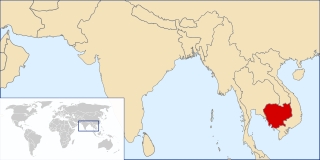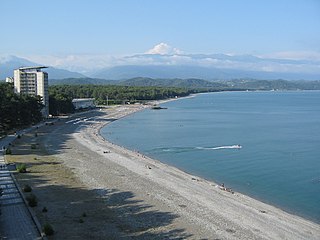
Angela Evelyn Vernon King was a Jamaican diplomat. She worked for the United Nations for 38 years, from 1966 to 2004, working mainly for equal rights for women. She was appointed Assistant Secretary-General for gender issues in 1997, remaining in that post until she retired in 2004.

United Nations Security Council resolution 765, adopted on 16 July 1992, after recalling resolutions 392 (1976), 473 (1980), 554 (1984) and 556 (1984), the council condemned the escalating violence in South Africa, in particular the Boipatong massacre on 17 June 1992, which resulted in the deaths of 46 people, and the suspension by the African National Congress (ANC) of bilateral talks with the South African government.

United Nations Security Council resolution 772, adopted unanimously on 17 August 1992, after recalling Resolution 765 (1992) concerning the Boipatong massacre in South Africa and a report from the Secretary-General, the Council authorised Boutros Boutros-Ghali to deploy observers to the country after concerns raised in the report, known as the United Nations Observer Mission in South Africa.

United Nations Security Council resolution 783, adopted unanimously on 13 October 1992, after recalling resolutions 668 (1990), 717 (1991), 718 (1991), 728 (1992), 745 (1992) and 766 (1992) and noting a report by the Secretary-General Boutros Boutros-Ghali, the council welcomed the progress the United Nations Transitional Authority in Cambodia (UNTAC) had made in Cambodia in accordance with the Paris Agreements, however it recognised various security and economic concerns facing UNTAC.
United Nations Security Council resolution 792, adopted on 30 November 1992, after recalling resolutions 668 (1990), 717 (1991), 718 (1991), 728 (1992), 745 (1992), 766 (1992) and 783 (1992) noting a report by the Secretary-General Boutros Boutros-Ghali, the Council concerned itself with preparations for the 1993 elections in Cambodia by the United Nations Transitional Authority in Cambodia (UNTAC) while condemning the refusal of the Party of Democratic Kampuchea to co-operate.

United Nations Security Council resolution 810, adopted unanimously on 8 March 1993, after recalling resolutions 668 (1990) and 745 (1992), the council, after deploring continuing political violence in Cambodia in violation of the Paris Agreements as well as attacks and detention of members of the United Nations Transitional Authority in Cambodia (UNTAC), discussed upcoming elections to the Constituent Assembly, as part of a process of national reconciliation.

United Nations Security Council resolution 832, adopted unanimously on 27 May 1993, after recalling resolutions 637 (1989), 693 (1991), 714 (1991), 729 (1992), 784 (1992) and 791 (1992), the council noted a report by the Secretary-General Boutros Boutros-Ghali and enlarged the mandate of the United Nations Observer Mission in El Salvador (ONUSAL) to include the observation of the electoral process.

United Nations Security Council resolution 840, adopted unanimously on 15 June 1993, after recalling resolutions 668 (1990), 745 (1992), 810 (1993), 826 (1993), 835 (1993) and other relevant resolutions, the Council endorsed the results of the 1993 general elections in Cambodia.

United Nations Security Council resolution 865, adopted unanimously on 22 September 1993, after reaffirming resolutions 733 (1992), 746 (1992), 751 (1992), 767 (1992), 775 (1992), 794 (1992), 814 (1993) and 837 (1993), the Council addressed the process of national reconciliation and political settlement in Somalia, during the civil war.

United Nations Security Council resolution 866, adopted unanimously on 22 September 1993, after reaffirming resolutions 813 (1993) and 856 (1993), the council noted that United Nations involvement would contribute significantly to the effective implementation of the peace agreement in Liberia and went on to establish the United Nations Observer Mission in Liberia (UNOMIL).

United Nations Security Council resolution 872, adopted unanimously on 5 October 1993, after reaffirming resolutions 812 (1993) and 846 (1993) on the situation in Rwanda and Resolution 868 (1993) on the security of United Nations operations, the council stressed the need for an international force in the country and therefore established the United Nations Assistance Mission for Rwanda (UNAMIR).

United Nations Security Council resolution 881, adopted unanimously on 4 November 1993, after reaffirming resolutions 849 (1993), 854 (1993), 858 (1993) and 876 (1993) concerning the Georgian–Abkhazian war, the Council extended the mandate of the United Nations Observer Mission in Georgia (UNOMIG) until 31 January 1994.

United Nations Security Council resolution 882, adopted unanimously on 5 November 1993, after reaffirming resolutions 782 (1992) and subsequent resolutions on Mozambique, the council noted, in addition to positive developments in the country, that some aspects of the Rome General Peace Accords had not been implemented.

United Nations Security Council resolution 888, adopted unanimously on 30 November 1993, after recalling resolutions 637 (1989), 693 (1991), 714 (1991), 729 (1992), 784 (1992), 791 (1992) and 832 (1993), the council expressed concern at aspects of the situation in El Salvador and extended the mandate of the United Nations Observer Mission in El Salvador (ONUSAL) until 31 May 1994.

United Nations Security Council resolution 911, adopted unanimously on 21 April 1994, after reaffirming resolutions 813 (1993), 856 (1993) and 866 (1993), the Council welcomed progress made towards establishing the Liberian National Transitional Government but was concerned about subsequent delays in implementing the Cotonou Peace Agreement, and extended the mandate of the United Nations Observer Mission in Liberia (UNOMIL) until 22 October 1994.
United Nations Security Council resolution 916, adopted unanimously on 5 May 1994, after reaffirming Resolution 782 (1992) and all subsequent resolutions on Mozambique, the council decided to renew the mandate of the United Nations Operation in Mozambique (ONUMOZ) for a final period ending 15 November 1994, and discussed the implementation of the Rome General Peace Accords.
United Nations Security Council resolution 920, adopted unanimously on 26 May 1994, after recalling resolutions 637 (1989), 693 (1991), 714 (1991), 729 (1992), 784 (1992), 791 (1992), 832 (1993), 888 (1993), the council discussed the implementation of peace agreements in El Salvador and extended the mandate of the United Nations Observer Mission in El Salvador (ONUSAL) until 30 November 1994.

United Nations Security Council resolution 930, adopted unanimously on 27 June 1994, after recalling resolutions 772 (1992) and 894 (1994), the Council noted with satisfaction that a democratic and non-racial government had been established in South Africa, and terminated the United Nations Observer Mission in South Africa (UNOMSA).

United Nations Security Council resolution 968, adopted unanimously on 16 December 1994, after noting statements by the president of the security council and reports by the Secretary-General Boutros Boutros-Ghali on the situation in Tajikistan, the council established the United Nations Mission of Observers in Tajikistan (UNMOT) and addressed the process of national reconciliation in the country.

United Nations Security Council resolution 1020, adopted unanimously on 10 November 1995, after recalling all resolutions on the situation in Liberia, particularly 1001 (1995), the Council discussed the implementation of the peace process during the First Liberian Civil War and adjusted the mandate of the United Nations Observer Mission in Liberia (UNOMIL) to include other functions.

















